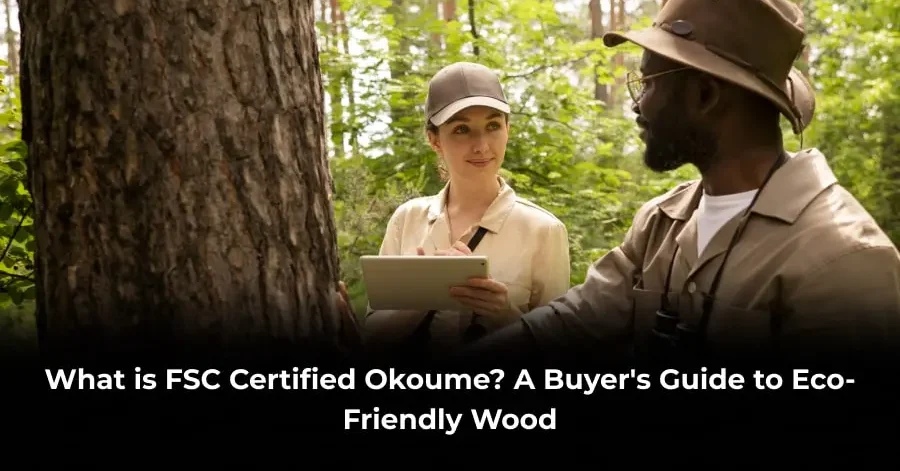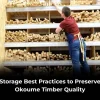You’re planning a project. Maybe it’s a beautiful piece of furniture, a custom boat, or an intricate veneer installation. You’ve done your research and keep hearing about a remarkable material: Okoume wood. It’s lightweight, easy to work with, and has a beautiful, subtle grain. But then you stumble upon the term “FSC Certified Okoume,” and the questions start piling up. What does that even mean? Why should you care? And where do you find reputable hardwood timber suppliers who can provide it?
In an age where our choices directly impact the planet, selecting your materials is about more than just aesthetics and budget; it’s a statement of your values. This guide is designed to demystify FSC Certified Okoume, turning you from a curious buyer into a confident, eco-conscious consumer. We’ll take a deep dive into the very nature of this unique African wood, unpack the crucial importance of the FSC certification, and provide a practical roadmap for sourcing it responsibly for your next masterpiece. Let’s embark on this journey to understand not just the ‘what,’ but the ‘why’ and ‘how’ of ethical wood sourcing.
Getting to Know Okoume: The African Gem
First, let’s meet the star of the show. Okoume (pronounced oh-KOO-may), scientifically known as Aucoumea klaineana, is a hardwood species native to the lush, equatorial rainforests of West-Central Africa, primarily in Gabon, which accounts for nearly 90% of its growth, as well as Equatorial Guinea, and the Republic of Congo. Despite being classified a hardwood, it’s surprisingly light—comparable to pine or cedar—which is one of its most prized characteristics. This combination of a hardwood’s stability with a softwood’s workability is what sets okoume wood apart in the world of timber.
For woodworkers, boat builders, and designers, okoume wood is a dream to work with. Its straight, fine, and uniform grain allows for exceptionally easy cutting, planing, and sanding, resulting in a silky-smooth finish with minimal tear-out. It holds screws and nails well without excessive splitting and takes adhesives, paints, and stains beautifully and evenly. Its color is a soft, warm pinkish-brown to pale salmon, often with a lovely, subtle sheen, making it a fantastic choice for projects where a light, elegant finish is desired without the need for heavy staining. When you visit a well-stocked woodworking supplies store, you’ll often find it in the form of plywood sheets, but it’s also available as solid lumber for more specialized applications.
Because of its unique properties, you’ll often find okoume wood used in:
- Marine Plywood: This is its most famous application. Its excellent resistance to checking and cracking, combined with its light weight and good bendability, makes it a top-tier choice for boat hulls, decks, and interior boat furniture, helping to improve fuel efficiency and performance on the water.
- Fine Furniture and Cabinetry: For cabinets, tables, and chairs where reducing overall weight is a consideration without sacrificing strength or aesthetic appeal. Its pale hue complements modern, Scandinavian, and light-filled interior designs perfectly.
- Veneer and Paneling: Its attractive, consistent, and often figured grain is perfect for interior surfaces, doors, and architectural millwork, providing a touch of warmth and sophistication.
- Musical Instruments: Luthiers value it for the construction of some guitars and other stringed instruments for its balanced tonal qualities, offering a clear and resonant sound.
But here lies the core dilemma for the eco-conscious maker. The very forests that produce this magnificent okoume wood are under constant threat from illegal and unsustainable logging practices. This is where the story pivots critically from “what is Okoume” to “what is FSC Certified Okoume.”
The Green Stamp of Approval: What Does FSC Certified Really Mean?
FSC stands for the Forest Stewardship Council. Think of them not just as a certification body, but as the international guardians of the world’s forests. They are a non-profit organization, established in the wake of the 1992 Earth Summit, that sets the globally recognized gold standard for responsible forest management. When you see the FSC logo on a product, it’s not just a marketing sticker; it’s a promise backed by a rigorous, traceable chain of custody.
An FSC certification tells a comprehensive story. It means the okoume wood you are holding was harvested from a forest that is managed to the highest environmental, social, and economic standards. This includes a multifaceted approach:
- Environmental Protection: This is the cornerstone. Logging is strictly controlled and planned to protect biodiversity, water quality, and soil stability. It’s not about clear-cutting; it’s about selective harvesting that mimics natural forest disturbances, preventing deforestation and ensuring the forest remains a vibrant, functioning ecosystem for generations to come. Protected areas and high conservation value forests are identified and preserved.
- Social Responsibility: The FSC standard rigorously upholds the rights and well-being of indigenous communities and forest workers. This includes recognizing their land tenure rights, ensuring safe working conditions, providing fair wages, and giving local communities a voice in forest management decisions. It’s about people and planet.
- Economic Viability: The forest is managed as a sustainable, long-term resource, not a short-term commodity to be mined. This provides stable, long-term jobs and wood products without compromising the forest’s future health or productivity.
So, when you consciously choose FSC Certified Okoume, you are directly supporting this holistic system that values the health of the planet and its people. You are casting a vote with your wallet for a greener, more equitable future. This is no longer a niche concern but a crucial consideration for any modern builder or designer when they are looking for hardwood timber for sale.
Also Read – The History of Wood Grading: From Traditional Rules to Modern Okoume Standards
A Buyer’s Practical Guide to Sourcing Your Eco-Friendly Wood
Now that you understand the compelling “why,” let’s talk about the practical “how.” Finding and purchasing FSC Certified Okoume requires a bit more diligence than buying standard lumber, but the process is straightforward and well worth the effort for the peace of mind it brings.
1. Identifying Genuine FSC Certification:
In a market rife with greenwashing, vigilance is key. When browsing a woodworking supplies store or contacting hardwood timber suppliers, you need to look for the specific FSC logo and understand its meaning. There are three primary types of labels you will encounter:
- FSC 100%: The product is made entirely from wood sourced from FSC-certified forests. This is the purest, most impactful choice.
- FSC Mix: The product is made from a mix of FSC-certified wood, controlled wood (which mitigates the risk of unacceptable material), and/or recycled material. This is common in panel products.
- FSC Recycled: The product is made from 100% post-consumer or post-industrial recycled material.
For the most direct contribution to sustainable forest management, aim for FSC 100% when purchasing your okoume wood.
2. Asking the Right Questions:
Don’t be shy! Reputable suppliers expect and welcome these questions, as it shows you are an informed customer. Prepare to ask:
- “Can you provide the FSC chain of custody certificate or code for this specific batch of okoume wood?” (Every legitimate supplier has one).
- “Is this specific batch of hardwood timber for sale FSC 100% certified or FSC Mix?”
- “How do you, as hardwood timber suppliers, ensure and verify the sustainability of your sourcing from the point of harvest?”
A trustworthy supplier will have transparent, readily available answers and will be proud of their certification. If they are evasive or unable to provide documentation, consider it a significant red flag.
3. Where to Buy: From Local Stores to Specialized Suppliers:
Your local woodworking supplies store may carry a selection of FSC-certified products, but for a specific and often imported material like Okoume, you will frequently have better luck and a wider selection with specialized importers or online hardwood timber suppliers. These companies have invested in building direct relationships with certified mills and forest managers overseas, ensuring a fully verifiable and documented chain of custody from the forest to your workshop. When searching online for hardwood timber for sale, always use specific, targeted keywords like “FSC 100% Certified Okoume plywood” or “sustainable Okoume lumber” to filter your results effectively.
4. Understanding the Cost and Value:
Let’s address the elephant in the room: Yes, FSC Certified Okoume often comes with a slightly higher price tag than its uncertified counterpart. This isn’t merely a profit-driven markup; it’s a reflection of the true, internalized cost of sustainable management. It accounts for the careful, selective logging techniques, the comprehensive planning and auditing, the fair wages and safety equipment for workers, and the long-term stewardship of the forest land. View this not as an extra expense, but as an investment in a healthier planet and a more stable future supply of the woods we love. The value extends far beyond the board-foot price.
Why Your Choice Matters: The Ripple Effect of Responsible Sourcing
Choosing FSC Certified Okoume extends its positive impact far beyond the four walls of your workshop. Every single purchase creates a powerful, far-reaching ripple effect:
- You Actively Combat Climate Change: Healthy, managed forests are among the planet’s most powerful carbon sinks, actively absorbing and storing CO2 from the atmosphere. Sustainable forestry is a proven nature-based solution to the climate crisis.
- You Protect Biodiversity: You are directly helping to preserve the complex habitat for countless species, from forest elephants and lowland gorillas to rare birds, insects, and plants that call these ecosystems home.
- You Support Communities: You contribute to stable, ethical livelihoods for the people who live in and depend on the forest, helping to lift communities out of poverty while preserving their cultural heritage.
- You Drive Market Change: Your conscious demand for certified products signals to the entire industry—from loggers to retailers—that sustainability is not a passing trend but a fundamental market imperative. It encourages more and more hardwood timber suppliers to adopt responsible practices to meet consumer demand.
By making an informed choice, you become an active part of the solution. You help ensure that the beautiful okoume wood you use with a clear conscience today will be available for the inspired craftsmen and builders of tomorrow.
Finding a Partner in Sustainability: A Spotlight on AEW Woods
Navigating the world of sustainable timber can feel complex, but you don’t have to do it alone. Finding a supplier who shares your values and has done the hard work of due diligence is half the battle. This is where companies like AEW Woods come into the picture as invaluable partners.
AEW Woods has firmly established itself as a leading and trusted supplier of high-quality, sustainably sourced wood products. They understand on a deep level that today’s discerning craftsmen, builders, and architects are looking for more than just hardwood timber for sale; they are looking for a guarantee of responsibility and a story they can be proud of. As dedicated and knowledgeable hardwood timber suppliers, they make it a core part of their mission to prioritize offering FSC-certified options, including premium okoume wood in both plywood and lumber form. They ensure that their customers have seamless access to materials they can feel genuinely good about using, without compromising on quality or performance.
Whether you are a professional boat builder sourcing marine-grade plywood, a custom furniture maker selecting the perfect veneer, or a dedicated DIY enthusiast embarking on a home project, partnering with a supplier like AEW Woods simplifies the entire process. They act as your expert filter, having already done the rigorous due diligence on the chain of custody and sustainability credentials of their products. You can walk into their physical woodworking supplies store or browse their detailed online inventory with the confidence that the materials you select are supporting the very highest ethical and environmental best practices. Choosing a supplier like this transforms a simple material transaction into a meaningful partnership for a better world.
Conclusion
Choosing wood is one of the most fundamental and intimate decisions a maker can make. It’s the soul and the structural heart of your project. By deliberately choosing FSC Certified Okoume, you are selecting a material that is not only beautiful, versatile, and an absolute pleasure to work with but also carries with it a profound legacy of responsibility and care.
You are making a conscious choice to be part of a global solution—to support the preservation of our planet’s vital lungs, the protection of its irreplaceable biodiversity, and the dignity of the communities that steward these resources. The next time you search for hardwood timber for sale, remember the power you hold in your decision. Seek out and build relationships with reputable hardwood timber suppliers, ask the important questions that demand transparency, and always look for the trusted FSC label. Whether you source from a general woodworking supplies store or a dedicated, mission-driven specialist like AEW Woods, your decision to use FSC Certified okoume wood is a powerful testament to the fact that true, meaningful craftsmanship respects both the beauty of the material and the integrity of its origin. Build beautifully, and build responsibly. Your project, and our planet, will be better for it.
Frequently Asked Questions (FAQs)
- Is all Okoume wood automatically FSC certified?
No, absolutely not. Okoume is a species of wood, while FSC is a certification for how that wood is harvested. A significant amount of okoume wood on the market is harvested without these safeguards. Always look for the FSC logo or ask your supplier for proof of certification. - Is FSC Certified Okoume significantly more expensive?
There is a cost premium, typically ranging from 10-20%, but it can vary. This cost reflects the sustainable practices behind it. Many woodworkers find the peace of mind and the environmental benefits well worth the additional investment, making it a key consideration when evaluating hardwood timber for sale. - I’m just a hobbyist. Does my small purchase really make a difference?
Yes, it absolutely does! The collective power of millions of small purchases is what drives large-scale market change. Every time a customer asks for FSC-certified products at a woodworking supplies store, it sends a powerful message up the supply chain. - Can I use FSC Certified Okoume for outdoor projects?
While Okoume is often used in marine plywood for boats, it is not naturally rot-resistant like teak or cedar. For prolonged outdoor use, it must be properly sealed, painted, or epoxy-coated for protection. Consult with your hardwood timber suppliers for the best finishing recommendations for your specific project. - Where can I find a reliable woodworking supplies store that sells FSC Certified Okoume?
Start by searching online for “FSC Certified Okoume” or “sustainable hardwood timber suppliers” in your region. Specialized marine lumberyards are also an excellent source. Don’t hesitate to call ahead and ask about their certification and inventory before visiting.






